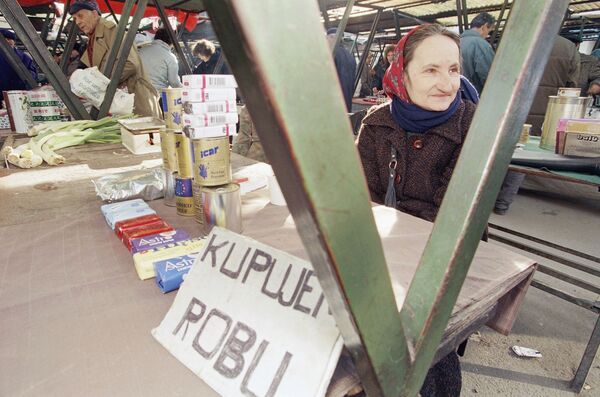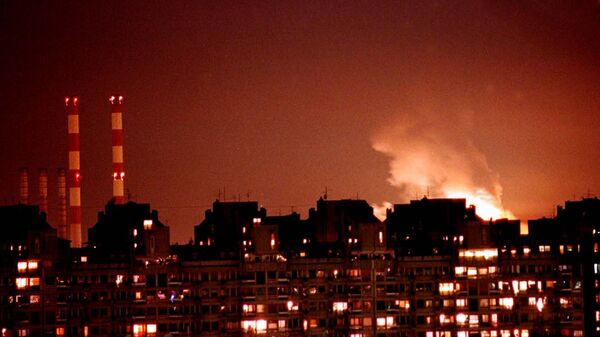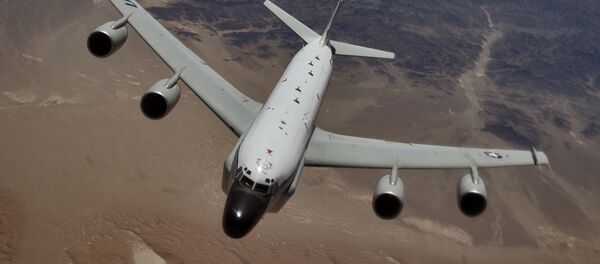It's uncertain when Serb forces learned of Claes' announcement, but in any event, they almost undoubtedly had little time to prepare — precision strikes against selected targets in Serb-held Bosnia and Herzegovina began raining down not long after, in the early hours of August 30.
Operation Deliberate Force is launched by NATO against Bosnian Serb forces. Two hundred sorties are flown during th.. #aviation #history pic.twitter.com/rRLOrpnGux
— Aviation History (@HistoryAviation) August 30, 2017
The campaign would last for two and a half weeks — in excess of 5,000 personnel and 400 aircraft hailing from 15 NATO-member nations, including Belgium, Canada, Denmark, France, Germany (the first time the Luftwaffe had seen combat since 1945), Italy, Spain, Turkey, the US and UK participated, flying 3,515 sorties from Aviano Air Base in Italy, and the US aircraft carriers Theodore Roosevelt and America stationed in the Adriatic Sea.
In all, over the course of two-and-a-half weeks, NATO forces dropped a total of 1,026 bombs on 338 Bosnian Serb targets located within 48 complexes — 97 percent of the strikes were deemed to be "on target" and over 80 percent of those targets were seriously damaged.
Virtually powerless in the face of the unrelenting onslaught, Serb leaders were compelled to accede to NATO demands — namely, signing the controversial Dayton Peace Agreement, a governing framework for Bosnia and Herzegovina that remains in place in 2017.
Spanish Hornet drivers in Aviano, Sept. 1995 Operation Deliberate Force #AircraftPhoto #DeliberateForce pic.twitter.com/K8SqnTNKbf
— AircraftTalking (@AircraftTalking) September 1, 2015
New Era
In an official review of the bombing issued by NATO on the operation's 10th anniversary, Professor Ryan C. Hendrickson, a political scientist at Eastern Illinois University, was clear about the action's significance — on top of "shattering" Bosnian Serb communications and compelling Serb forces to sign the Dayton Agreement, it "effectively ended" the "out-of-area" debate that had dominated discussions about NATO's continued relevance and role following the end of the Cold War.
On the latter point, Professor Hendrickson is particularly candid — Operation Deliberate Force "ushered in a new era" for NATO, helping set the foundation for the "much larger" range of non-Article 5 missions the alliance would subsequently become involved in, which moved NATO "way beyond" its original raison d'etre of assuring the collective defense of its member nations.
The initial years of the post-Cold War epoch were indeed a time of much anxiety and insecurity at the upper echelons of NATO, for the military alliance, founded for the express purpose of "keeping the Russians out, the Americans in and the Germans down" suddenly found itself bereft of a threat to guard against. Critics of NATO were quick to demand the termination of the bloc — leaders for a variety of economic, political and military reasons desperate not to see its end proceeded to embark on a protracted hunt for a new fangled purpose for the alliance. NATO top brass were clear on what that new purpose would be — NATO would have to go "out-of-area" or go out of business. The only questions were where, how and why.
Perfect Pretext
The implosion of Yugoslavia provided an ideal resolution to this triumvirate. The secession of Bosnia and Herzegovina from the federation in 1992 had produced much unrest — the region had long been multi-ethnic, dating back to its former incarnation as a province of the Ottoman Empire.
While previously the groups enjoyed a relatively harmonious existence, in the first multi-party election in Bosnia and Herzegovina in November 1990, votes were cast largely according to ethnicity — 44 percent of the population considered themselves Bosniak, 32.5 percent Serb, 17 percent Croat and six percent simply Yugoslav.

The Bosniak-dominated parliament subsequently sought to declare its independence without holding a public referendum — in response, in January 1992 Bosnian Serbs proclaimed the establishment of the "Republic of the Serbian People in Bosnia-Herzegovina" (Republika Srpska).
The move was seen by Bosnian leaders as an attempt to illegitimately break away from the fledgling country, and sectarian fighting erupted almost immediately.
This was a conflict developing in NATO's "backyard" — and internal strife within Russia meant the former Soviet Union would not be likely to stand in the way of Western military action directed against the dissolving confederation. Starting in 1992, NATO entered into a "peacekeeping" mission in the Balkans, which quickly escalated into direct military engagement — by 1994, restricted air campaigns had begun.
"Operation Deliberate Force" lasted 22 days and involved 400 aircraft from 15 nations dropping 1,026 bombs. pic.twitter.com/wTtPGm0XdS
— Charles Apple (@charlesapple) August 30, 2015
The aptly named Operation Deliberate Force had been planned and approved by the North Atlantic Council in July 1995, although the plans lacked a United Nations mandate — this would change following the August 28, 1995 Markale massacre in which Serb forces were alleged to have shelled a market in Sarajevo.
It would not be until over 20 years later that John Russell, a former United Nations official, would reveal it was "impossible" to ascertain which army fired the shells that hit the market — and he believed at the time Bosnian government forces had in fact conducted the strike.

Nonetheless, the incident provided NATO with a perfect pretext for comprehensive involvement in the struggle — and the operation's success in securing the Dayton Agreements were subsequently used to justify the alliance's 1999 campaign in Kosovo, that unseated Serbian President Slobodan Milosevic in a 78-day air assault.
The "triumph" of that campaign has in turn been used to justify every NATO aggression since, including the 2001 invasion of Afghanistan, and the 2011 "intervention" in the Libyan civil war.
Meanwhile, almost two decades since the Dayton Agreements entered into force, ethnic strife still runs rampant in Bosnia and Herzegovina, and international administrators effectively run Bosnian politics, overruling elected local officials. Moreover, thousands of foreign troops remain stationed in the country — arguably fulfilling NATO's paradoxical aim of "managing the security risks created by its own existence."



